The phase 2 RCT has already received ethics approval from the NSW Ministry of Health and the University of Technology Sydney, and will be led by Dr Janet Schloss from Endeavour College of Natural Health, together with renowned neurosurgeon Professor Charlie Teo.
The trial will seek to determine if orally ingested medicinal cannabis is safe for patients suffering from Glioblastoma multiforme (GBM), a highly aggressive type of primary brain tumour, as well as whether it can slow tumour growth when used in conjunction with standard cancer treatments.
In addition to funding the trial, BioCeuticals will also provide the whole plant extract medicinal cannabis to be consumed by the participants.
Determining the dosage
Speaking to NutraIngredients-Asia, MD Eyal Wolstin said: "The trial is the first of its kind being conducted in Australia, whereby we actually administer oral doses of medicinal cannabis to see if we can slow the growth of malignant brain tumours, as well as to ease some symptoms the patients may suffer from, such as nausea and fatigue.
He added that the age group of the participants may vary, with the minimum age being 18.
The trial will run for 12 weeks, during which the medicinal cannabis will be administered. After that, the researchers will continue to monitor the patients for two years, during which they will undergo standard MRI and blood tests, and see their regular physicians.
"We will be using two different doses. One of the formulations will contain a 1:1 ratio of CBD to THC — 6mg/ml of CBD and 6mg/ml of THC. The second will contain a 1:4 ratio — 3.8mg/ml of CBD, and 15mg/ml of THC.
"It's a very good opportunity for both doctors and patients to see whether there is a difference between the two formulations, if either will have any side effects, and the level of efficacy displayed. One may be better than the other for pain management, or in helping to reduce the size of tumours. But ultimately, we hope it will support the quality of life and overall well-being of the patients."
In an official release, Dr Schloss said, "If we can establish dosage guidelines and determine whether medicinal cannabis can assist standard treatment, this could be life-changing for glioma patients and their families."
Legal challenges
Wolstin revealed that BioCeuticals had engaged a GMP-certified Canadian company to produce the medicinal cannabis for the trial.
"To bring a product from overseas and put it through TGA (Therapeutic Goods Administration) and ethics approvals takes a long time, and we are pleased we can do it with this company, as their medicinal cannabis comes from an organic whole plant extract.
"We have visited and audited their facilities to ensure they are of the highest quality, and we believe this is the best product to bring to market."
Wolstin also emphasised the importance of cooperation between medical professionals and complementary medicine experts, with the patient "at the centre of everything we want to achieve".
He believes the regulatory hurdles are partially responsible for a lack of industry knowledge, saying, "Many GPs have been in touch with us to find out more, but less than 10% would even consider prescribing medicinal cannabis, simply because they don't know if it works.
"There are ingredients that still cannot be listed in Australia, and we will continue to work with the TGA to obtain all the clinical data required for these ingredients to be listed."
He said the goal was to improve accessibility to medicinal cannabis. At the moment, all applications for the usage of medicinal cannabis must go through the Special Access Scheme, and so far, only 2,000 patients have been approved to use medicinal cannabis.
The manufacture and production of cannabis products is also difficult in Australia, though industry and advocates have been pushing for greater opportunity.
"We hope the trial will have a positive outcome, which will enable us to administer medicinal cannabis in a more holistic way, such as for palliative care and pain relief.
"But at this stage, more scientific evidence is crucial, which is why we have invested over half a million dollars in this clinical trial. We want there to be rigorous research behind our product, ensure its efficacy, and make sure the patient is getting the best treatment possible using medicinal cannabis."
Recruitment for the trial has begun, led by Professor Teo through his clinic at Prince of Wales Private Hospital in New South Wales. The research team at Endeavour College of Natural Health will then assess these patients and others with glioblastoma to determine which of them meet the inclusion criteria.

